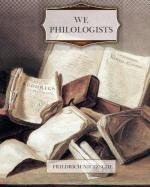Philology as the science of antiquity does not, of course, endure for ever; its elements are not inexhaustible. What cannot be exhausted, however, is the ever-new adaptation of one’s age to antiquity; the comparison of the two. If we make it our task to understand our own age better by means of antiquity, then our task will be an everlasting one.—This is the antinomy of philology: people have always endeavoured to understand antiquity by means of the present—and shall the present now be understood by means of antiquity? Better: people have explained antiquity to themselves out of their own experiences; and from the amount of antiquity thus acquired they have assessed the value of their experiences. Experience, therefore, is certainly an essential prerequisite for a philologist—that is, the philologist must first of all be a man; for then only can he be productive as a philologist. It follows from this that old men are well suited to be philologists if they were not such during that portion of their life which was richest in experiences.
It must be insisted, however, that it is only through a knowledge of the present that one can acquire an inclination for the study of classical antiquity. Where indeed should the impulse come from if not from this inclination? When we observe how few philologists there actually are, except those that have taken up philology as a means of livelihood, we can easily decide for ourselves what is the matter with this impulse for antiquity: it hardly exists at all, for there are no disinterested philologists.
Our task then is to secure for philology the universally educative results which it should bring about. The means: the limitation of the number of those engaged in the philological profession (doubtful whether young men should be made acquainted with philology at all). Criticism of the philologist. The value of antiquity: it sinks with you: how deeply you must have sunk, since its value is now so little!
8
It is a great advantage for the true philologist that a great deal of preliminary work has been done in his science, so that he may take possession of this inheritance if he is strong enough for it—I refer to the valuation of the entire Hellenic mode of thinking. So long as philologists worked simply at details, a misunderstanding of the Greeks was the consequence. The stages of this undervaluation are . the sophists of the second century, the philologist-poets of the Renaissance, and the philologist as the teacher of the higher classes of society (Goethe, Schiller).
Valuing is the most difficult of all.
In what respect is one most fitted for this valuing?
—Not, at all events, when one is trained for philology as one is now. It should be ascertained to what extent our present means make this last object impossible.
—Thus the philologist himself is not the aim of philology.
9




